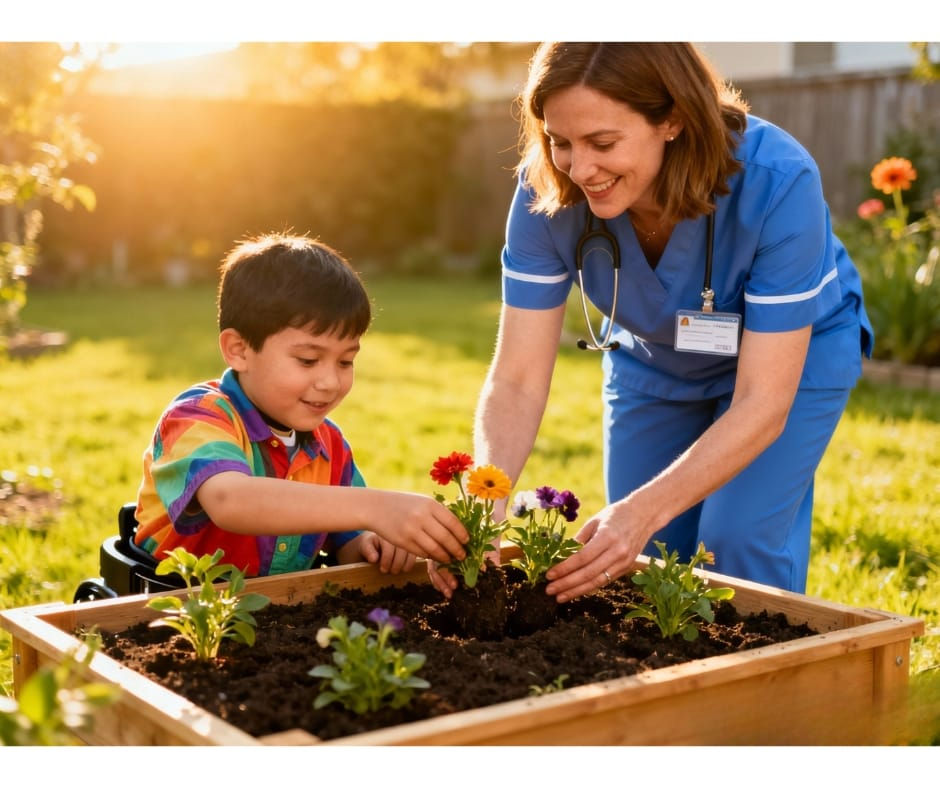Gardening as Therapy | How Outdoor Activities Improve Mood and Mobility
- LHAHealing Designs
- Oct 10, 2025
- 3 min read
Updated: Oct 11, 2025
Gardening isn’t just a hobby—it’s therapy. Explore how simple outdoor activities can reduce stress, improve balance, and promote joy for seniors and individuals with special needs.

Gardening as Therapy — How Simple Outdoor Activities Improve Mood and Mobility
Nature heals.
From the touch of soil to the scent of flowers, spending time outdoors offers measurable health benefits. For seniors, individuals in recovery, and children with special needs, gardening is more than an activity—it’s therapy.
At Legacy Healthcare Advantage, we integrate therapeutic gardening into care routines to strengthen physical mobility, emotional well-being, and connection to life’s simple joys.
The Science Behind Gardening Therapy
The American Horticultural Therapy Association (AHTA, 2023) defines horticultural therapy as the purposeful use of plants and gardening to improve health and quality of life.
A 2022 study in the Journal of Aging and Health found that older adults who participated in gardening twice a week experienced lower depression scores and improved hand strength.
Similarly, the National Institutes of Health (NIH, 2021) confirmed that light outdoor activity such as gardening increases serotonin levels, reduces blood pressure, and enhances cognitive function.
(Sources: AHTA, 2023; Journal of Aging and Health, 2022; NIH, 2021)
Physical Benefits of Gardening

Improved Mobility: Gardening encourages stretching, squatting, and light lifting, which enhance joint flexibility and muscle tone.
Better Balance: Research from the Journal of Rehabilitation Medicine (2021) found that repetitive bending and reaching during gardening improves balance and reduces fall risk in seniors.
Cardiovascular Support: Moderate gardening burns 200–400 calories per hour, similar to walking, supporting heart health.
Enhanced Fine Motor Skills: Planting seeds and trimming leaves help maintain hand strength and coordination, beneficial for post-stroke recovery or arthritis.
(Sources: Journal of Rehabilitation Medicine, 2021)
Mental and Emotional Benefits
Stress Reduction: Exposure to sunlight increases vitamin D and serotonin, improving mood and reducing anxiety.
Cognitive Stimulation: Identifying plants and planning layouts engage memory and executive function.
Sense of Purpose: Growing and nurturing plants fosters responsibility and self-worth, especially for individuals with dementia or depression.
Social Connection: Group gardening projects promote conversation and teamwork, combating loneliness.
A Frontiers in Psychology (2022) meta-analysis concluded that people who engaged in nature-based activities like gardening showed 25% higher life satisfaction than those who did not.
(Source: Frontiers in Psychology, 2022)
Safe Gardening Tips for Seniors and Special Needs

Choose Accessible Spaces: Use raised garden beds or container gardens to reduce bending.
Keep Tools Lightweight: Ergonomic tools prevent strain on wrists and shoulders.
Stay Hydrated and Protected: Encourage breaks, shade, and sunblock use.
Start Small: Plant easy herbs or flowers like basil, mint, or marigold for quick results.
Encourage Sensory Gardening: Fragrant herbs or colorful flowers stimulate touch, sight, and smell—ideal for dementia or autism therapy.
How Legacy Healthcare Advantage Incorporates Gardening Therapy
Our caregivers encourage outdoor and sensory-based activities as part of holistic care.
We integrate:
Gentle gardening exercises into rehabilitation routines
Safe outdoor mobility support for seniors
Family-inclusive gardening sessions to promote bonding
Coordination with occupational and physical therapists
At Legacy Healthcare Advantage, our goal is not just to treat—but to cultivate joy and independence through nature.
Gardening teaches patience, growth, and resilience—qualities shared by every caregiver and client we serve. A few minutes with the soil can brighten a day, strengthen the body, and calm the mind.

Want to bring more healing activities into your loved one’s daily care?
External Citations:



